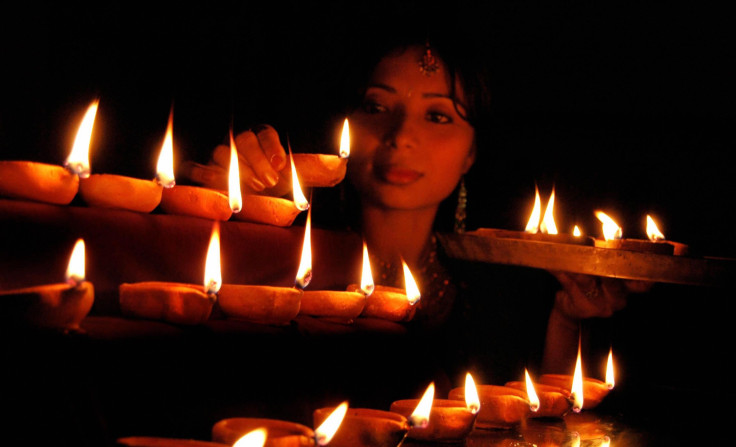What Is Diwali 2018? Greetings To Celebrate Festival Of Light

Diwali or “Deepavali” is a five-day festival of light celebrated by Hindus across the globe, but predominantly in India, and is meant to symbolize the victory of good over evil and the ushering in of an era of knowledge which would end the rule of darkness and ignorance.
“Deepavali” in a Sanskrit word from which the term “Diwali” was derived from, which means a row of lights. The festival of light starts with Dhanteras, followed by Chhoti (small) Diwali, Diwali, Ganesh Puja (worship of Lord Ganesha) and Bhai Dooj (celebration of brother-sister bond). This year, the festival began Monday (Oct. 5) and will conclude Friday (Oct. 9), with Wednesday marking the day of the main celebration.
According to popular Indian mythological text, the Ramayana, Diwali was celebrated the day Lord Rama returned to his birth place and kingdom, Ayodhya, along with his wife, Sita and brother, Lakshmana, after being exiled for 14 years. Rama’s return was cause for double celebration in his native land as it also marked the 20th day after he had defeated the evil Ravana, the King of Lanka, and successfully rescued his wife from his clutches.
Another popular legend tells the tale of Goddess Lakshmi (the goddess of wealth and prosperity) getting married to Lord Vishnu (God of Vaishnaism) and hence people worship idols of Lakshmi-Narayan (an avatar of Vishnu) in their households.
In the days leading up to Diwali, people are seen cleaning (often re-painting) their houses, and decorating their residences with flowers, lamps, lights and rangolis (tradition of drawing decorative patterns made with ground rice and ground powder on the floor).
The five-day-long festival kicks off with Dhanteras, an occasion which Hindus consider auspicious to buy jeweler and utensils due to their belief that metal wards off evil spirits. On Chhoti Diwali and the day after that, people are seen worshiping and offering their prayers during the day and lighting diyas (earthen lamps) and bursting crackers at night.
On the fourth day, people worship God Ganesha, who is believed to remove hurdles from the path of prosperity and on Bhai Dooj, sisters vow to protect their brothers against all forms of harm.
Wondering what is the best way of wishing your loved ones on the festival of light? Here are a few options of heart-felt Diwali greetings you can try out, courtesy India TV News and NDTV:
- Wish you and your family a very Happy Diwali! May the lights guide you and brightness never leave your side.
- Diwali is a day to cherish with your loved ones. May you have a great time with your family and friends Wishing you the very best this Diwali...
- Light a lamp of love! Blast a chain of sorrow! Shoot a rocket of prosperity! Fire a flowerpot of happiness! wish you and your family a sparkling Diwali!
- May the colors of rangoli fill up your life with brightness and magic! Happy Diwali to you.
- May Goddess Lakshmi bless you and your family in abundance. May the year be a prosperous one for you. Happy Diwali.
- May the festival of lights dispel darkness, ignorance and evil from the world. Wishing every one a very Happy Diwali!
- With gleam of diyas and the echo of the chants, may happiness and contentment fill your life. Wish you a very happy and prosperous Diwali!
- Let's celebrate the festival of light as it brings the happiness, the joy, the hope, and the prosperity in life. Wish you all Happy Diwali!
© Copyright IBTimes 2025. All rights reserved.






















